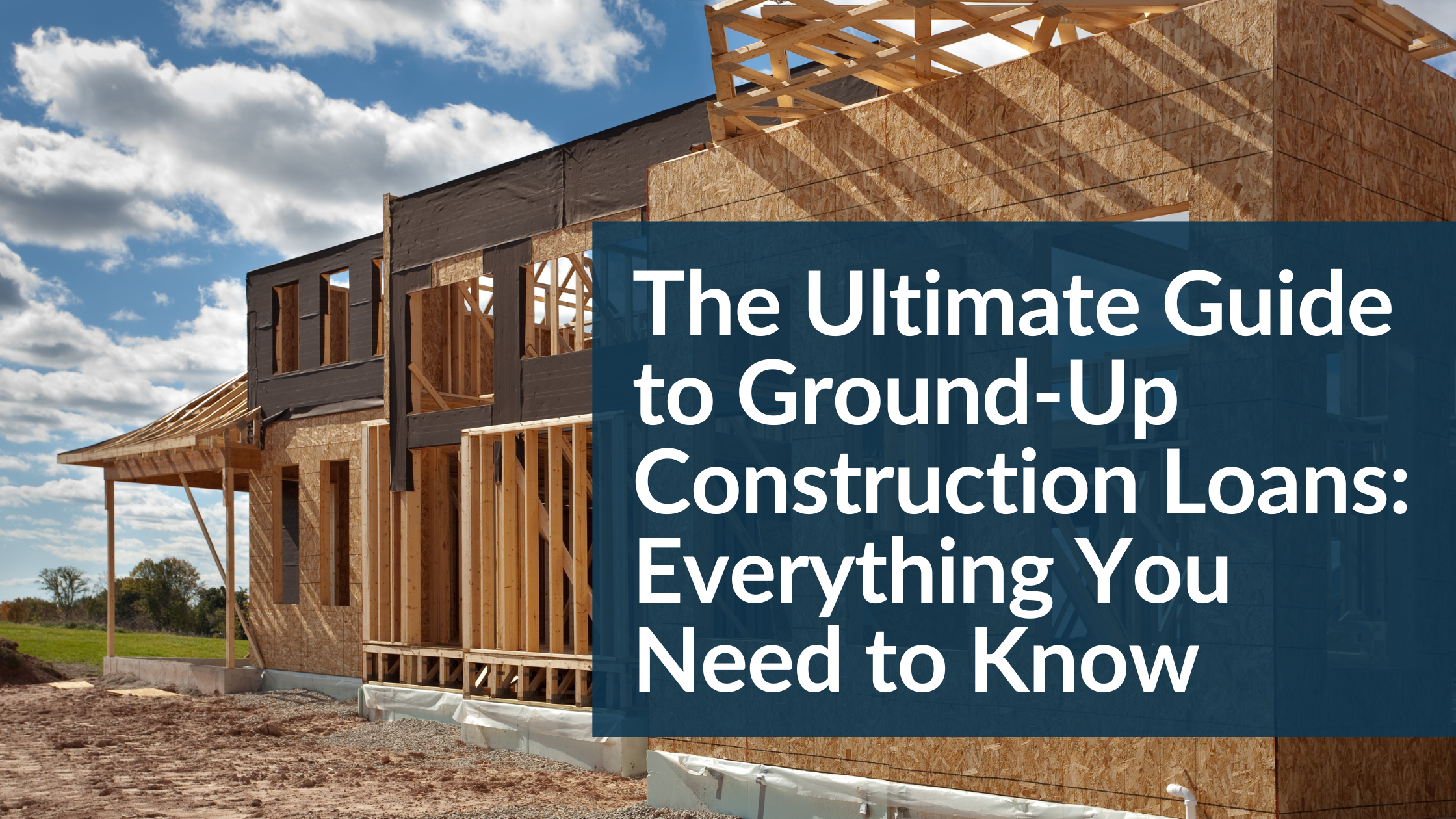The Ultimate Guide to Ground-Up Construction Loans: Everything You Need to Know

In the realm of real estate investment, ground-up construction projects offer a unique opportunity for investors to build a property from scratch and reap potential long-term benefits. However, financing these types of projects can be complex and intimidating for even the most seasoned investors. That's where ground-up construction loans come into play.
In this comprehensive guide, we will take you through everything you need to know about ground-up construction loans. From understanding the basics of these loans to navigating the application process, we'll cover all the essential information to help you make informed decisions and successfully fund your construction projects.
Get ready to dive into the intricacies of ground-up construction loans, including eligibility requirements, loan terms, different types of construction loans, tips for finding the right lender, and more. Whether you're a first-time real estate investor or looking to expand your portfolio, this guide will equip you with the knowledge and confidence you need to make sound financial choices.
Don't let the complexities of ground-up construction loans deter you from pursuing your real estate dreams. Let's embark on this journey together and explore the world of ground-up construction financing.
The benefits of ground-up construction loans
Ground-up construction loans offer several benefits to real estate investors and developers. Firstly, these loans provide an opportunity to create a property tailored to your specific needs and preferences. Whether you're building a residential, commercial, or mixed-use property, ground-up construction allows for customization and flexibility in design and functionality.
Another advantage of ground-up construction loans is the potential for higher returns on investment. By building from scratch, investors can take advantage of market demand and create properties that meet current market trends and demands. Additionally, constructing a new property often allows for higher rental or sale prices compared to existing properties, potentially increasing your profit margins.
Ground-up construction loans also enable investors to have full control over the development process. From selecting the location and design to managing the construction timeline, investors have the opportunity to oversee every aspect of the project. This level of control can be appealing to those looking to leave their mark on the real estate market and create a portfolio of unique properties.
The requirements for obtaining a ground-up construction loan
Obtaining a ground-up construction loan requires meeting certain eligibility criteria and providing the necessary documentation to support your loan application. While the specific requirements may vary among lenders, there are some common factors that lenders consider when evaluating loan applications.
One of the key requirements is a detailed and comprehensive construction plan. This includes architectural plans, engineering designs, cost estimates, and a construction timeline. Lenders need to assess the feasibility and profitability of the project, and these documents provide crucial insights into the project's viability.
In addition to the construction plan, lenders also consider the borrower's financial stability and creditworthiness. This includes a review of the borrower's credit history, income, assets, and liabilities. Lenders want to ensure that the borrower has the financial capacity to repay the loan and cover any unexpected costs or delays that may arise during the construction process.
Another important requirement is the borrower's experience and track record in real estate development. Lenders prefer working with borrowers who have a proven track record of successfully completing construction projects. This demonstrates the borrower's ability to manage risks, navigate potential challenges, and deliver projects on time and within budget.
The application process for ground-up construction loans
The application process for ground-up construction loans typically involves several steps, starting with gathering all the necessary documentation and submitting a loan application to the lender. Here's an overview of the typical application process:
- Preparation and Documentation: Before applying for a ground-up construction loan, you need to gather all the necessary documentation, including architectural plans, engineering designs, cost estimates, a construction timeline, financial statements, and personal identification documents. It's essential to ensure that all the documents are accurate, up-to-date, and comprehensive.
- Loan Application Submission: Once you have identified potential lenders, submit your loan application along with all the required documentation. Ensure that your application is complete, well-organized, and clearly presents the details of your construction project, financial stability, and experience.
- Loan Evaluation and Underwriting: After receiving your loan application, the lender will evaluate the project's feasibility, your financial stability, and your experience in real estate development. This may involve a thorough examination of the construction plans, cost estimates, financial statements, credit history, and other relevant factors.
- Loan Approval and Terms Negotiation: If your loan application is approved, the lender will present you with the loan terms and conditions. Evaluate the terms carefully, including interest rates, repayment schedule, draw schedule, and any additional fees. Negotiate with the lender if necessary to ensure the terms align with your financial goals and expectations.
- Closing and Disbursement: Once you have accepted the loan terms, the lender will proceed with the closing process, which involves signing the loan agreement and other legal documents. After the closing, the lender will disburse the funds according to the agreed-upon draw schedule, typically releasing the funds in stages as the construction progresses.
Choosing the right lender for your ground-up construction loan
Selecting the right lender for your ground-up construction loan is a critical step in the process. The lender you choose can significantly impact the success and profitability of your construction project. Here are some factors to consider when evaluating potential lenders:
- Research and Selection of Lenders: Conduct thorough research to identify reputable lenders who specialize in ground-up construction loans. Consider factors such as their experience in the industry, interest rates, loan terms, and customer reviews. Shortlist a few lenders that align with your requirements and objectives.
- Experience and Specialization: Look for lenders who specialize in ground-up construction loans and have experience in financing similar projects. They will have a better understanding of the unique challenges and requirements associated with these types of loans.
- Reputation and Track Record: Research the lender's reputation in the industry and their track record of successful loan approvals and timely disbursements. Read customer reviews and testimonials to gain insights into their level of professionalism, responsiveness, and customer satisfaction.
- Loan Terms and Conditions: Evaluate the loan terms and conditions offered by different lenders. Compare factors such as interest rates, repayment schedule, draw schedule, fees, and any additional requirements or restrictions. Choose a lender whose terms align with your financial goals and project objectives.
- Customer Support and Communication: Consider the level of customer support and communication offered by each lender. Building a property from the ground up can be a complex and challenging process, and having a lender who is responsive and provides clear communication can make a significant difference in the success of your project.
- Flexibility and Adaptability: Assess the lender's flexibility in accommodating changes or unexpected circumstances that may arise during the construction process. Look for lenders who understand the dynamics of construction projects and are willing to work with you to overcome challenges and ensure a successful outcome.
By carefully evaluating potential lenders based on these factors, you can choose a partner who not only provides the necessary funds but also supports your project's success.
The different types of ground-up construction loans
When it comes to ground-up construction loans, there are several types available, each serving different purposes and catering to specific project requirements. Understanding the different types of loans can help you determine which one is most suitable for your construction project. Here are some common types of ground-up construction loans:
- Construction-to-Permanent Loans: Construction-to-permanent loans, also known as "one-time close" loans, combine the financing for the construction phase and the permanent mortgage into a single loan. This type of loan is beneficial for individuals or companies who plan to build a property and then occupy or rent it out.
- Construction-only Loans: Construction-only loans provide funds exclusively for the construction phase of the project. Once the construction is complete, the borrower must secure a separate permanent mortgage to pay off the construction loan. This type of loan is suitable for borrowers who plan to sell the property immediately after construction or have alternative financing options for the permanent phase.
- Renovation Construction Loans: Renovation construction loans are designed for projects that involve substantial renovations or improvements to an existing property. These loans provide funds to cover the renovation costs, allowing investors to upgrade and enhance the property's value.
- Speculative Construction Loans: Speculative construction loans are used for projects where the borrower plans to construct a property without a specific buyer or tenant in place. These loans are typically riskier for lenders, as there is no guaranteed income from the property upon completion. Therefore, borrowers must demonstrate a strong track record and experience in similar projects to obtain this type of loan.
- Land Development Loans: Land development loans are used to finance the acquisition and development of raw land. These loans provide funds for site preparation, infrastructure development, and obtaining necessary permits and approvals. Once the land is developed, the borrower may seek additional financing to construct buildings or other structures on the property.
Understanding the different types of ground-up construction loans allows you to choose the one that best aligns with your project goals, timeline, and financial capacity.
Managing the budget and timeline for your ground-up construction project
Managing the budget and timeline for a ground-up construction project is crucial to its success. Effective budget and timeline management can help you avoid cost overruns, delays, and other challenges that may arise during the construction process. Here are some tips to help you manage your project effectively:
1. Thorough Planning and Cost Estimation: Before starting the construction, invest time and effort into detailed planning and accurate cost estimation. Work with architects, engineers, and other professionals to create a comprehensive construction plan and realistic cost estimates. Include contingencies in your budget to account for unforeseen expenses or changes in the project scope.
2. Regular Communication and Updates: Maintain open lines of communication with your construction team, including contractors, subcontractors, and suppliers. Regularly communicate with them to ensure everyone is aligned with the project's goals and timeline. Stay informed about the progress, address any concerns or challenges promptly, and make necessary adjustments to keep the project on track.
3. Efficient Project Management: Implement effective project management strategies to streamline the construction process. This includes setting clear goals and milestones, assigning responsibilities to team members, and regularly monitoring progress. Use project management software or tools to track tasks, budgets, and timelines to ensure efficient coordination and collaboration.
4. Vendor and Supplier Management: Establish strong relationships with vendors and suppliers to ensure timely delivery of materials and equipment. Work with reliable and reputable vendors who can provide quality products and services within the agreed-upon deadlines. Regularly review and assess vendor performance to identify any areas for improvement or potential risks.
5. Contingency Planning: Despite careful planning, unexpected challenges may arise during the construction process. Develop a contingency plan to address potential delays, cost overruns, or other unforeseen circumstances. This may involve setting aside additional funds, identifying alternative suppliers or subcontractors, or adjusting the project timeline to accommodate unforeseen events.
By effectively managing the budget and timeline for your ground-up construction project, you can minimize risks, control costs, and ensure a successful outcome.
Tips for a successful ground-up construction loan experience
Navigating the world of ground-up construction loans can be challenging, but with the right approach, you can increase your chances of a successful loan experience. Here are some tips to help you along the way:
1. Do Your Research: Take the time to thoroughly research ground-up construction loans and familiarize yourself with the specific requirements, terms, and conditions. Understand the risks and challenges associated with these types of loans, as well as the potential benefits. This knowledge will empower you to make informed decisions and negotiate favorable terms with lenders.
2. Build a Strong Team: Surround yourself with a team of experienced professionals who can provide valuable insights and guidance throughout the construction loan process. This may include architects, contractors, real estate attorneys, and financial advisors. Their expertise will help you navigate the complexities of the project and ensure its success.
3. Plan Ahead: Careful planning is key to a successful ground-up construction loan experience. Develop a comprehensive construction plan, including detailed budgets, timelines, and contingency plans. Present this plan to potential lenders to demonstrate your preparedness and increase your chances of loan approval.
4. Maintain Financial Stability: Lenders assess your financial stability and creditworthiness when considering your loan application. Maintain a good credit score, manage your debts responsibly, and demonstrate a strong financial position. This will instill confidence in lenders and increase your chances of obtaining favorable loan terms.
5. Establish Strong Relationships: Building strong relationships with lenders, contractors, and other stakeholders is crucial for a successful ground-up construction loan experience. Cultivate open lines of communication, establish trust, and maintain professional relationships throughout the construction process. This will help you navigate challenges, resolve issues, and ensure a smooth loan experience.
6. Stay Informed: The real estate market and construction industry are constantly evolving. Stay informed about market trends, regulations, and industry developments that may impact your construction project or loan terms. This knowledge will enable you to make proactive decisions and adapt to changing circumstances effectively.
By following these tips, you can enhance your ground-up construction loan experience and increase the likelihood of a successful construction project.
Common challenges and how to overcome them in ground-up construction projects
Ground-up construction projects can be lucrative for real estate investors, but they're not without their bumps. Unexpected delays, budget overruns, and unforeseen complications can chip away at your returns. Fear not, intrepid investor! Here's a battle plan for navigating the common challenges of ground-up construction and securing your real estate empire:
Challenge 1 Permitting: Getting permission to build is like a tricky maze. Build a team of experts who know the rules. Check the spot well and have meetings to solve problems ahead of time. It's like having a map to get through the maze faster!
Challenge 2 Budget: Going over budget can melt your profits away. Plan finances carefully. Include extra money for unexpected costs and changes in material prices. Keep a close eye on costs and check regularly to avoid going over budget.
Challenge 3 Materials: Running out of materials or delays can mess up your construction plans. Use different suppliers! Don't depend on just one for important stuff. Have backup options.
Challenge 4 Labor Costs: Every second counts as an investor. Be sure to account for contractor labor.
Challenge 5 Unforeseen Weather Conditions: Bad weather can cause problems in construction. Be ready for it. Plan extra time and money for delays. Use materials and methods that can handle bad weather without causing issues
Remember, investors, these challenges are not insurmountable! By anticipating potential pitfalls and implementing smart strategies, you can transform ground-up construction into a springboard for your real estate success. So, roll up your sleeves, grab your hard hat, and prepare to conquer the construction frontier!
Bonus tip: Leverage technology! Project management software, cost-tracking tools, and communication platforms can streamline your operations and keep you informed every step of the way.
With this arsenal of knowledge and a dose of strategic foresight, you can turn those ground-up construction challenges into cornerstones of your real estate empire. Now go forth and build!
Conclusion: Is a ground-up construction loan right for you?
Embarking on ground-up construction projects in real estate can be both rewarding and challenging for investors. The potential for custom-built properties and higher returns comes with the complexities of financing, managing budgets, and navigating unforeseen obstacles. Ground-up construction loans serve as a crucial tool in this journey, offering financial support and opportunities for success.
In this guide, we've explored the intricacies of ground-up construction loans, covering everything from understanding the benefits and types of loans to managing budgets, and timelines, and selecting the right lender. Whether you're a novice investor or a seasoned pro, the key lies in thorough research, careful planning, and building a strong team to navigate the construction landscape.
Remember, challenges such as permitting hurdles, budget constraints, material shortages, and unpredictable weather are part of the construction adventure. However, with proactive strategies like assembling expert teams, meticulous planning, and leveraging technology, you can transform these challenges into stepping stones toward building your real estate empire.
As you venture into the world of ground-up construction, stay informed, build strong relationships, and adapt to changes in the market. With these tools in hand, you're well-equipped to turn your real estate dreams into reality. So, investors, put on your hard hats, embrace the challenges, and let the construction adventure begin!

.png)
